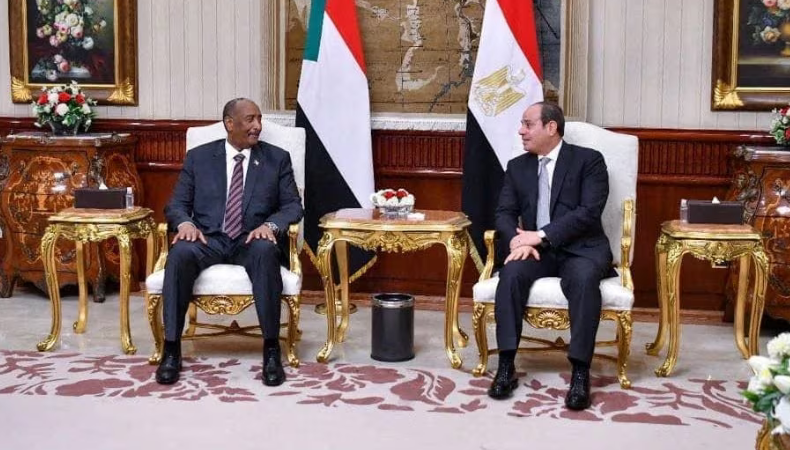Ramifications of Egypt’s Backing of Sudanese President Al-Burhan

Egypt’s backing of Sudanese President Al-Burhan has sparked a wave of geopolitical scrutiny, with ramifications that extend far beyond Sudan’s borders. At the heart of this discourse lies Egypt’s inadvertent support for the Sudanese Brotherhood, a connection that underscores a strategic misstep with potentially profound consequences.
By aligning itself with Al-Burhan and his military apparatus, Egypt inadvertently amplifies the influence of the Sudanese Brotherhood, enabling its expansion across borders and fostering potential collaboration with the Egyptian Brotherhood.
This strategic alliance not only raises questions about Egypt’s foreign policy priorities but also implicates it as an indirect partner of Iran. Reports suggest Iran’s involvement in arming militant groups, posing a direct threat to Egyptian national security. As Egypt finds itself entangled in complex regional dynamics, the implications of its support for Al-Burhan reverberate across the geopolitical landscape, necessitating a closer examination of its strategic alliances and their implications.
Supporting the Sudanese Brotherhood
Egypt’s support for Al-Burhan inadvertently extends to the Sudanese Brotherhood, amplifying its influence and potentially fostering collaboration with its Egyptian counterpart. This connection poses a significant threat as it could facilitate the spread of radical ideologies and destabilize the region.
Linking with the Egyptian Brotherhood
By aligning with Al-Burhan and his army, Egypt risks enabling the Sudanese Brotherhood to reach its borders and establish links with the Egyptian Brotherhood. This scenario could further exacerbate tensions within Egypt and pose internal security challenges.
Partnering with Iran
Egypt’s alliance with Al-Burhan implicates it as an indirect partner of Iran, a country known for its involvement in arming militant groups. Reports suggest that Iran has supplied weapons to Sinai, posing a direct threat to Egyptian national security. This collaboration with Al-Burhan’s regime indirectly bolsters Iran’s efforts to destabilize the region.
Around one year ago, significant advancements were made in the dialogue between Egypt and Iran, facilitated by Oman’s mediation efforts. There has been a notable increase in friendly and optimistic statements, particularly from the Iranian side, regarding relations between Cairo and Tehran.
The Implications of Egypt’s Support
Egypt’s backing of Sudanese President Al-Burhan carries significant implications for regional stability and security. While intended to address the crisis in Sudan, Egypt’s actions risk entangling it in complex geopolitical dynamics and aligning it with actors whose interests may run counter to its own.
Navigating Geopolitical Dynamics
As the conflict in Sudan continues to escalate, Egypt must navigate a delicate balance between regional alliances and national interests. The country finds itself at a crossroads, where its choices have implications beyond its borders. Egypt must carefully consider the consequences of its actions to safeguard its national interests effectively.
In light of these developments, Egypt must reassess its strategic priorities and alliances to ensure regional stability. By aligning with regimes and groups with dubious affiliations, Egypt risks undermining its own security and stability in the long term. As regional dynamics evolve, Egypt must prioritize the maintenance of peace and security in the region.
While Egypt has engaged in direct discussions with Tehran on various pressing matters concerning Syria, Iraq, Yemen, and Palestine, its approach may be fraught with strategic missteps.
Egypt’s endeavor to alleviate tensions in the Gaza Strip serves as a primary impetus for fostering closer relations with Tehran, given Iran’s strong ties with Palestinian factions like Hamas and Palestinian Islamic Jihad. Cairo’s priority is to uphold stability in the region and prevent any escalation of hostilities with Israel.
Moreover, Egypt plays a pivotal role in facilitating Palestinian reconciliation efforts, necessitating dialogue with Iran to promote stability in Gaza. However, Egypt’s support for Sudanese President Al-Burhan and his military forces may inadvertently align it with the Sudanese Brotherhood, potentially enabling the group to extend its influence across borders and collaborate with the Egyptian Brotherhood.
This strategic alignment also implicates Egypt as an indirect partner of Iran, which has reportedly supplied weapons to Sinai, posing a direct threat to Egyptian national security. Thus, while Egypt seeks to navigate complex geopolitical dynamics in the region, its support for Al-Burhan’s regime may have far-reaching implications for its own security and stability.
While Egypt has engaged in direct discussions with Tehran on various pressing matters concerning Syria, Iraq, Yemen, and Palestine, its approach may be fraught with strategic missteps.
Egypt’s endeavor to alleviate tensions in the Gaza Strip serves as a primary impetus for fostering closer relations with Tehran, given Iran’s strong ties with Palestinian factions like Hamas and Palestinian Islamic Jihad. Cairo’s priority is to uphold stability in the region and prevent any escalation of hostilities with Israel.
Keep Reading
Moreover, Egypt plays a pivotal role in facilitating Palestinian reconciliation efforts, necessitating dialogue with Iran to promote stability in Gaza. However, Egypt’s support for Sudanese President Al-Burhan and his military forces may inadvertently align it with the Sudanese Brotherhood, potentially enabling the group to extend its influence across borders and collaborate with the Egyptian Brotherhood.
This strategic alignment also implicates Egypt as an indirect partner of Iran, which has reportedly supplied weapons to Sinai, posing a direct threat to Egyptian national security. Thus, while Egypt seeks to navigate complex geopolitical dynamics in the region, its support for Al-Burhan’s regime may have far-reaching implications for its own security and stability.
By backing Al-Burhan, Egypt inadvertently supports the Sudanese Brotherhood and aligns itself with Iran, posing threats to regional stability and security. As the crisis in Sudan unfolds, Egypt must carefully consider the consequences of its actions and prioritize the maintenance of peace and stability in the region.








